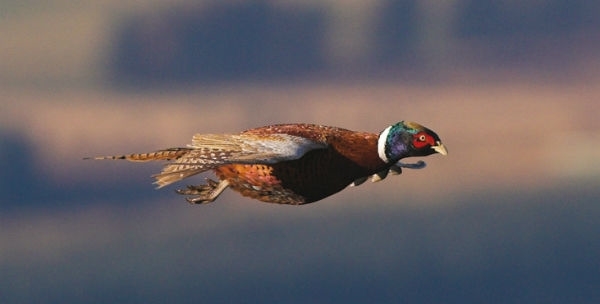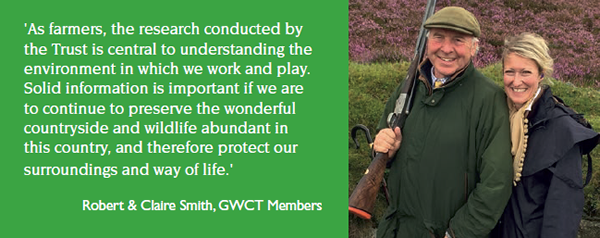
Background
Last year, the body that runs and administers Welsh Government land, Natural Resources Wales (NRW), carried out a review of the use of firearms on its land here. It had a wide remit, including: should NRW continue to use firearms to control species that are damaging trees in its woodland, should it use them to control invasive, non-native species that are threatening our native animals, and how about native predators that can heavily impact their prey? It also considered leasing Welsh Government owned land for pheasant shoots. These are important topics, and it is absolutely right that NRW conducted such a thorough assessment of the activities on its own land.
How did NRW review the evidence?
The process was clear: there was to be a call for evidence, a review of what was received, a report would be produced, and external experts would evaluate it. This all happened as planned. The review considered over 250 pieces of evidence, an expert panel of 19 specialists from NRW met, and the report was produced. It contained four recommendations here.
These were:
1) Continue to manage the negative impacts of wild species on NRW land using guns
2) Continue to consider applications from others to control wild species using guns on its land
3) Continue to consider applications to run pheasant and other shoots on its land
4) Continue to use lead ammunition on its land
The public consultation
This ran from January to April this year and received almost 5,000 responses. Public opinion was not in favour of any of the proposals. In fact, over 70% of those who responded were opposed to the recommendations here.
Did the NRW Board meeting in July agree the four recommendations?
Yes. The Board paper for the September meeting says “At the July Board meeting all recommendations were agreed” here. At this meeting, they accept all four recommendations on the basis that the scientific evidence and experience of experts outweighed public opinion here.
Did the July meeting consider the letter from Hannah Blythyn?
Yes. They agreed all four recommendations despite receiving an intervention from Hannah Blythyn, Welsh Minister for Environment, in the form of a letter to NRW, which expressed the Welsh Government’s position with regard to shooting here. Minister Blythyn stated that the Welsh Government does not support commercial pheasant shooting and asked that its position was considered in the decision.
Why did the evidence outweigh public opinion?
From protecting NRW timber production to saving ground-nesting birds, the review did not produce any single, or combination of, effective alternatives to firearms. The NRW review also recognised the evidence that pheasant shooting can positively contribute to biodiversity, wellbeing, rural enterprise, jobs and community cohesion. NRW staff knew this because they spent 2,000 hours studying it. This is why they made their recommendations despite the results of the public consultation. If NRW had made the decision based purely on public opinion, not one of these recommendations would have been implemented.
What happened at the NRW Board meeting in September?
NRW still supports pheasant shooting on their land. However, the agreements that allow three shoots to use using Welsh government land will not be renewed. This is simply because the landowner has requested it to cease here.
NRW board papers identify this as a risk to its reputation here. They said: “the decision is not evidence-based or consistent with the outcome of NRW’s Review of the use of firearms”
Was the political guidance from Hannah Blythyn binding?
No. Minister Blythyn said at the National Assembly for Wales (after the NRW decision was announced) that the matter was one for ongoing consideration and the letter did not bind NRW to accept the government’s position here.
The decision was based on Hannah Blythyn’s intervention – not public opinion.
1. Is Hannah Blythyn voicing her own personal views, expressed as the position of the Welsh Government?
Where is the Welsh Government position statement on shooting? Upon what is it based? Was there a debate? Why did NRW not appear to be aware of this before? If the government position is at odds with the outcome of the NRW evidence review, perhaps this indicates that the position should be reconsidered.
2. Where are the impact assessments on closing the three existing pheasant shoots?
The September NRW Board paper says these have been completed here. Where are they? Do they comply with the recommendations in the July papers that the “local impacts of the activity on SMNR and the Well-Being Goals should be assessed.” here
3. Where is the final NRW Position Statement?
This was prepared for the July meeting and revised for the September meeting. When will it be published? Does it say that NRW will continue to consider the renewal of pheasant shooting leases on their land?
The truth is, this situation undermines the decision-making process and therefore the validity of other decisions made by the Welsh Government.
All of this could have been avoided if the policy and decision making process within Welsh Government had been conducted in an open and transparent way.
What do we do?
- We use science to promote game and wildlife management as an essential part of nature conservation.
- We develop scientifically researched game and wildlife management techniques.
- We promote our work to conservationists, including farmers and landowners and offer an on-site advisory service on all aspects of game and wildlife management, so that Britain’s countryside and its wildlife are enhanced for the public benefit.
- We influence government policy with sound science that creates progressive and effective policies.
- We support best practice for field sports that contribute to improving the biodiversity of the countryside.
Donate by Credit or Debit Card >>
Got a PayPal account? Donate faster here:


What do we believe?
- Scientific research should underpin sustainable conservation practice.
- Game and wildlife management is the foundation of good conservation.
- Field sports (in particular shooting and fishing) can contribute substantially to the conservation of landscape, habitat and wildlife.
- Humane and targeted predator control is an essential part of effective game and wildlife conservation.
- We utterly oppose those who engage in wildlife crime.
- Good conservation goes hand-in-hand with economic land use.
How your money is spent
- We spent over £5m on vital game and wildlife research and public education in 2017.
Donate by Credit or Debit Card >>
Got a PayPal account? Donate faster here:
